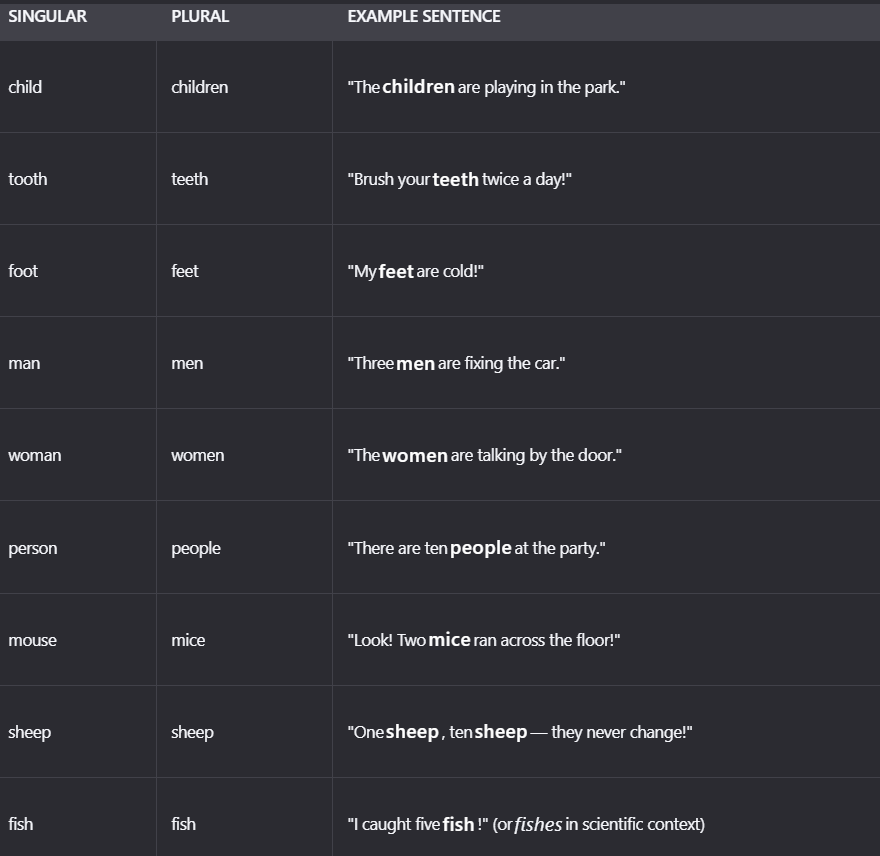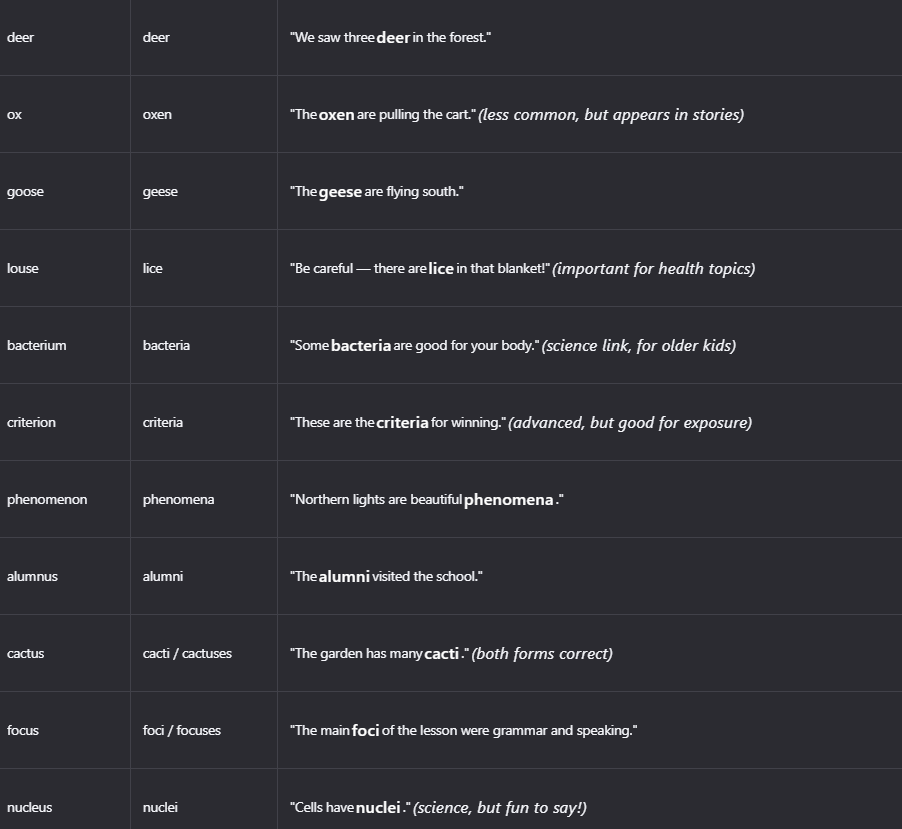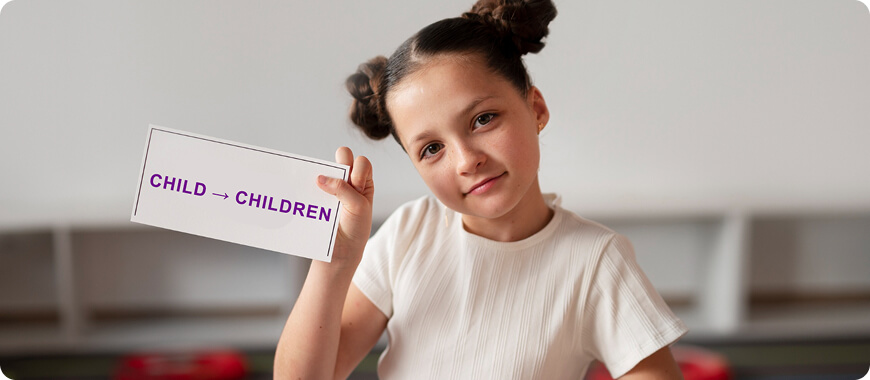You’ve probably heard it before: “I have three foots!” or “Look at the mouses!”
If your child is making these mistakes, don’t worry — you’re not alone. In fact, mixing up plural nouns is completely normal when learning English. But here’s the good news: with the right approach, your child can master irregular plural nouns — like children, teeth, and mice — quickly, confidently, and without tears.
At Learnlink, we’ve helped hundreds of children aged 4–10 learn English grammar through fun, interactive lessons. And today, we’re sharing our proven methods with you.
Why Kids Say "Foots" and "Mouses" — And How to Help Them
Children are clever little pattern-makers. When they learn that most words become plural by adding -s or -es (cat → cats, box → boxes), they naturally assume all words follow the same rule. So when they say “foots” or “sheeps”, they’re not wrong — they’re just applying logic.
But English, as we know, loves exceptions. And that’s where irregular plural nouns come in.
The Most Common Irregular Plural Nouns Kids Need to Know
Let’s be honest — no one enjoys memorising grammar rules. But when it comes to irregular plural nouns, a little practice goes a long way. Here are the words your child will hear (and need to use) most often.
Top 20 Irregular Plurals Every Child Should Master


Funny Mistakes Kids Make (And Why They’re Actually Good!)
- “He has two mouses on his desk!”
- “Sheepes are so fluffy!”
- “We saw five deers in the forest!”
These errors might make you smile — and they should! Mistakes are a sign of progress. When your child says “foots”, it means they understand the idea of plurals — they just need help with the exceptions.
How to Remember Tricky Pairs: Memory Tricks & Visuals
Our teachers at Learnlink use simple tricks to help kids remember:
- Teeth vs. feet: “Teeth are in your mouth, feet are on the floor — but both have ee!”
- Mice vs. rats: “Only mice wear tiny crowns in cartoons!”
- Sheep and fish: “These words don’t change — one sheep, ten sheep. Just like magic!”
Simple Rules for Teaching Irregular Plurals — No Grammar Jargon!
You don’t need to be a grammar expert to help your child. At Learnlink, we break everything down into simple, memorable rules — no confusing terms like “vowel mutation” or “consonant shift”.
Rule 1: Some Words Don’t Change (fish, sheep, deer)
Yes, really! Words like fish, sheep, and deer stay the same in singular and plural form.
- One sheep → Ten sheep
"Look at the sheep in the field!"
- One fish → Five fish
"I caught three fish yesterday!"
- One deer → A herd of deer
"We saw two deer in the woods."
Tip: Use toys or drawings to show “one sheep” vs “many sheep”.
Rule 2: The "F" to "V" Change (tooth → teeth, foot → feet)
Many words that end in -f or -fe change to -ves — but not all!
- leaf → leaves,
- knife → knives
- wife → wives
- life → lives
But: roof → roofs (not “rooves”), belief → beliefs, chief → chiefs
Rule 3: Vowel Changes (man → men, woman → women)
Some words change their inside vowel to form the plural. These are tricky because there’s no single rule — but with practice, they become second nature.
Repeat:
- man → men,
- woman → women,
- person → people.
- goose → geese
- tooth → teeth
- foot → feet
Sing this rhyme:
"One foot, two feet, red shoes on your feet! One tooth, two teeth, brush them every day!"
Rule 4: Words That Just Need to Be Memorized
Some irregular plural nouns don’t follow any rule. They just are. But that doesn’t mean they can’t be fun to learn!
Examples:
- Child → children
"The children are playing in the park."
🎵 Sing: "One child, two children, laughing in the sun!"
- Ox → oxen
"The oxen pulled the plough on the farm."
(Older word, but appears in fairy tales and history books.)
- Cactus → cacti (or cactuses)
"The desert is full of cacti!"
(Both forms are correct — "cacti" is more common.)
- Focus → foci (or focuses)
"The foci of the lesson were speaking and grammar."
(Advanced, but good for older kids.)
- Nucleus → nuclei
"Cells have nuclei."
5 Fun Games to Practice Irregular Plurals (No Worksheets!)
At Learnlink, we believe real progress happens through play. Here are the most popular games — try them at home!
Game 1: "Plural Nouns Memory Match"
Print pairs of cards: one with the singular (child), one with the plural (children). Lay them face down. Take turns flipping two cards. If they match, you keep the pair!
Great for visual learners.
Game 2: "Teacher Says" (Like Simon Says, but with Plurals!)
Call out: “Teacher says… touch your feet!” or “Teacher says… point to the mice!”
If you hear “touch your foots”, don’t move — it’s wrong!
- Builds listening and quick thinking.
Game 3: "Toy Box Challenge" — Find & Say the Plural
Empty the toy box. Pick five toys. Ask: “What’s the plural of duck?” “And car?” “What about sheep?”
Let your child teach you — it boosts confidence!
Game 4: "Sing the Plurals!" — Catchy Song with Actions
Use a tune like “If You’re Happy and You Know It”:
“One child, two children — clap your hands!
One tooth, two teeth — brush them clean!
One mouse, two mice — squeak, squeak, squeak!
Now say the plurals — loud and clear!”
Your kids never forget it.
Game 5: "Plural Detective" — Spot the Mistake in Sentences
Say silly sentences:
- “There are three mouses in the kitchen!”
- “My two foots hurt!”
Let your child shout “Stop — that’s wrong!” and correct you.
Instant confidence boost.
How Learnlink Makes Grammar Fun (And Actually Works!)
You can try games at home — and they help. But real fluency comes from speaking with a teacher who knows how to make grammar stick.
Real Kids, Real Progress: How We Teach Irregular Plurals in Our Classes
In every Learnlink lesson, your child:
- Plays interactive games
- Repeats words with correct pronunciation
- Uses new vocabulary in real sentences
- Gets gentle, instant feedback
- No pressure. No boredom. Just progress.
We don’t teach grammar from a textbook. We use stories, songs, and conversation so kids absorb language naturally — just like they learned their first language.
Ready to Help Your Child Speak Correctly — Without the Stress?
Book your child’s FREE trial lesson today — and see how we turn tricky grammar into joyful moments.










